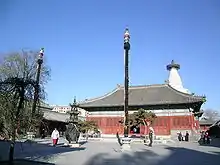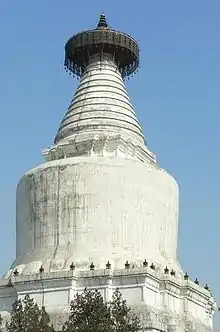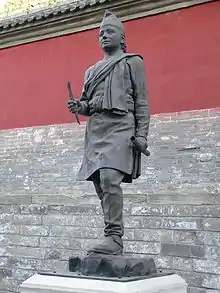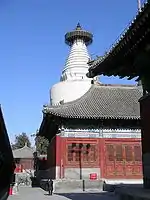Miaoying Temple
The Miaoying Temple (simplified Chinese: 妙应寺; traditional Chinese: 妙應寺; pinyin: Miàoyìng Sì), also known as the "White Stupa Temple" (Chinese: 白塔寺; pinyin: Báitǎ Sì), is a Chinese Buddhist temple on the north side of Fuchengmennei Street in the Xicheng District of Beijing.
| Miaoying Temple | |
|---|---|
 Main palace | |
| Religion | |
| Affiliation | Buddhism |
| Location | |
| Location | Beijing |
| Country | China |
| Geographic coordinates | 39.924°N 116.357°E |
There were temples built on the sites since the Liao and Yuan dynasties. The temple's famous white stupa also dates to the Yuan Dynasty. However, the present-building dates to the Ming dynasty as well as its given name, "Miaoying Si", meaning "Temple of Marvellous Response".[1]
In 1961, then Chinese Premier Zhou Enlai signed a Proclamation stating that the Temple was to be protected as a National Treasure. This Proclamation kept the White Stupa safe during the Cultural Revolution of the 1960s.
In 1976, the temple was seriously damaged by the Tangshan earthquake. The top of the stupa tilted to one side, the bricks and mortar supporting the stupa crumbled, and many relics were broken.
In 1978, the Beijing Department of Cultural Relics undertook the task of repairing and renovating the temple. The courtyards, the four corner-pavilions, the Hall of the Buddhas of the Three Ages, the Hall of the Heavenly Kings (Tianwang dian) in front of the stupa, the Hall of the Seven Buddhas and the stupa itself were repaired and renovated.[2]
The complex was again renovated in 2010.
 The White Pagoda
The White Pagoda The gate of the temple
The gate of the temple Statue of the Nepali architect, Araniko, who helped construct the temple's Pagoda
Statue of the Nepali architect, Araniko, who helped construct the temple's Pagoda From the sideview
From the sideview
See also
- History of Beijing
- Beihai Park, the location of another famous White Dagoba in Beijing
References
- Fu, Gongyue; Zhang, Hongjie; Yuan, Tiancai (1992). Jiujing Daguan [Old Beijing in Panorama]. p. 155.
- "Miaoying Monastery and White Dagoba". China Travel Guide. Archived from the original on 2012-08-20. Retrieved 2013-12-03.
External links
| Wikimedia Commons has media related to: |